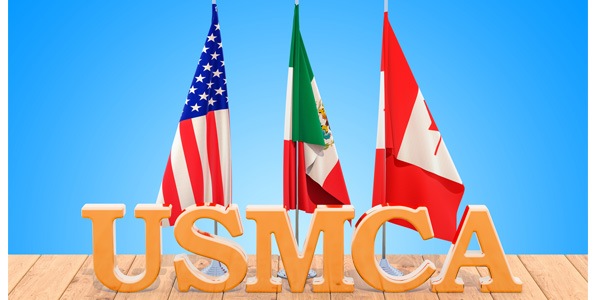
While the majority of automotive executives believe the United States-Mexico-Canada Agreement (USMCA) will have a positive impact on their companies in the long run, many of them also believe the newly negotiated trade pact will increase their production costs in the short term.
Those are the findings of a new survey from LevaData. Conducted in December by Propeller Insights on behalf of LevaData, the survey of 100 U.S.-based automotive executives touched on the USMCA and proposed tariffs on Chinese products, and their likely effects on the automotive industry.
Long-Term Benefits, Near-Term Drawbacks
The majority of automotive executives (78 percent) believe the changes required by the USMCA will have a positive impact on their company in the long term, and more than half (53 percent) believe the trade pact will increase North American vehicle manufacturing and provide a net improvement for workers and consumers.
However, many of the participants acknowledge production costs will increase significantly, resulting in higher prices for consumers:
- 41 percent believe production costs will increase by 10 percent over the next three years, and 26 percent believe the increase could be 25 percent or more.
- 58 percent agree the increases will results in higher costs for consumers.
Automotive execs see costs rising in areas such as electronic components, with 39 percent agreeing the USMCA will somewhat or significantly impact costs in this category. With electronic components increasingly comprising a larger share of a vehicle’s overall cost, the impact of the cost increases likely will be multiplied.
In what might be a signal that layoffs similar to GM’s recent cuts are coming, executives highlighted rising labor costs, with 73 percent stating employee payroll costs will increase or their workforce will be cut.
Big Changes Coming to Auto Supply Chain
In addition to raising prices on finished goods, auto execs will aggressively seek savings in the supply chain to reduce the impact of higher production costs:
- 36 percent plan to renegotiate parts-supply deals to pass costs to suppliers.
- 35 percent will look for cost savings in the production process .
Pressure to source components from suppliers near North American assembly plants also is a top concern among automakers:
- 61 percent predict suppliers near assembly plants will be favored somewhat or significantly.
- 78 percent cite finding North American suppliers or identifying alternate suppliers as a near-term priority for their supply chain.
The proposed tariff on $200 billion of Chinese goods also is top of mind. Thirty percent of the auto executives surveyed expressed concern about the impact the tariffs could have on their company, compared to 9 percent concerned over the USMCA’s impact.
“The adoption of USMCA, threats of tariffs on Chinese goods and concerns about the security of tech components made in China are going to be major concerns for the automotive industry in the coming years,” explained Rajesh Kalidindi, founder and CEO of LevaData. “Automakers will require a better upstream assessment of geopolitical risk considerations going forward. Knowing where tariffs might be applied and how they could impact cost and supply will be increasingly important – and virtually impossible to manage in Excel.”






